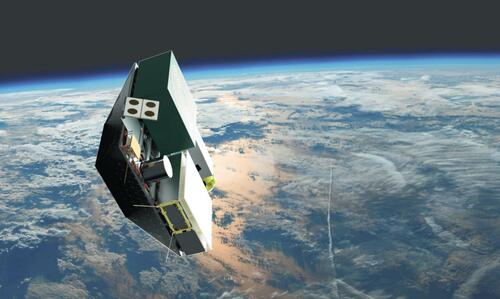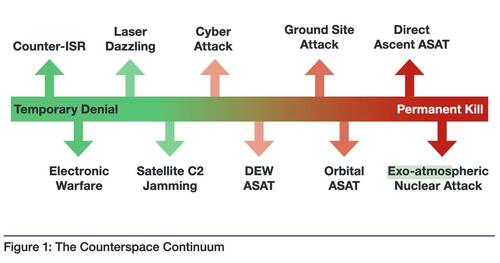UK Military Warns About Risk Of Nuclear Attacks From Space In New Report
As an increasingly ambitious China and Russia develop stronger weapons capabilities including hypersonic missiles that can hit a target on the other side of the planet after briefly exiting earth’s atmosphere, it’s not surprise that more western governments are reexamining their capabilities – both offensive and defensive – along humanity’s “final frontier” – space.
In in a new report published by Britain’s Ministry of Defense this week, authorities warn that aggressors could potentially develop capabilities to launch an “exo-atmospheric nuclear strike” that could result in a civilization-ending – or “permanent kill” to use their terms – scenario.
The report goes so far as to claim that a government’s ability to preserve the qualities of “daily life” for its citizens will in the future be dependent on control of space – a battle in which Britan’s “adversaries” are rapidly gaining advantage.
“Daily life is reliant on space and, for the Armed Forces, space underpins vital, battle-winning technologies. From space we can deliver global command & control, communications, intelligence, surveillance and reconnaissance, precision navigation, and more. Adversaries understand this reliance and are increasingly able to exploit vulnerabilities, threatening our strategic stability and security.”
The only means of protecting against such a ghastly eventuality long term will require close cooperation with Britain’s allies to establish dominance throughout Earth’s orbit, and beyond.
While maintaining control in the “space domain” is critical, the “constant, aggressive” state-power competition to establish dominance in space creates vulnerabilities for Britain and its “way of life”. The nature of threats range from cyber attacks and electromagnetic EMP-like assaults to an “exo-atmospheric nuclear attack” – that is, a nuclear missile guided by satellite, or even one launched from space.
Although the US Space Force launched by President Trump isn’t mentioned, the report concludes that “broadening and deepening multinational cooperation” is the UK’s only way to permanently secure its security priorities when it comes to space.
Beyond that, the report doesn’t offer any examples of defensive technologies that the British might use to defend themselves, although it does offer a commitment to “understand, design and field technologies to protect and defend UK interests” in the event of a space-based war. However, it does note that Britain plans to invest in space-based reconnaissance, from investing more than £5 billion ($6.8 billion) in ‘Skynet’ surveillance satellites to deepening Britain’s involvement in the US-led ‘Olympic Defender’ space defense program.
The report included a special section warning about Russia’s anti-satellite capabilities as well as anti-satellite missile tests that the report claimed spread debris across low earth orbit (of course, the report fails to mention similar tests carried out by the US and its ally India).
Examples of International Threats – Russia Russia has conducted a number of on-orbit activities that have drawn attention and concern from allies and partners across the globe. These include contesting the electromagnetic spectrum, targeting the vital link between satellites and ground segments, as well as satellites in orbit that can release smaller secondary and even tertiary devices (like a Russian doll), with the possibility that some may have a destructive capability. Twice in 2020, Russia continued with its series of test-launches of Direct Ascent Anti-Satellite weapons and in 2021 Russia conducted a destructive test that resulted in at least 1500 trackable pieces of debris in low earth orbit that was condemned by many.
“This destructive anti-satellite missile test by Russia shows a complete disregard for the security, safety and sustainability of space. The debris resulting from this test will remain in orbit, putting satellites and human spaceflight at risk, for years to come.”
And one for China as well.
“China has a robust direct-ascent anti-satellite (DA-ASAT) programme, multi-use capabilities on orbit that are necessary for Co-orbital ASAT weapons, and widely used electronic and cyber counterspace capabilities.”
“China continues to conduct tests of its operational… DA-ASAT system. However, China no longer needs to use kinetic tests to prove that its DA-ASAT capabilities can threaten any… satellite in Low Earth Orbit (LEO), and likely Medium Earth Orbit (MEO) and Geostationary Earth Orbit (GEO) as well.”
Whatever it does, the report’s conclusion is pretty definitive: Britain and it’s allies need to step up their planning and investment, because another, much more decisive “space race” has just begun.
Read the full report below:
Tyler Durden
Sun, 02/06/2022 – 10:30
via ZeroHedge News https://ift.tt/plHvIsy Tyler Durden


